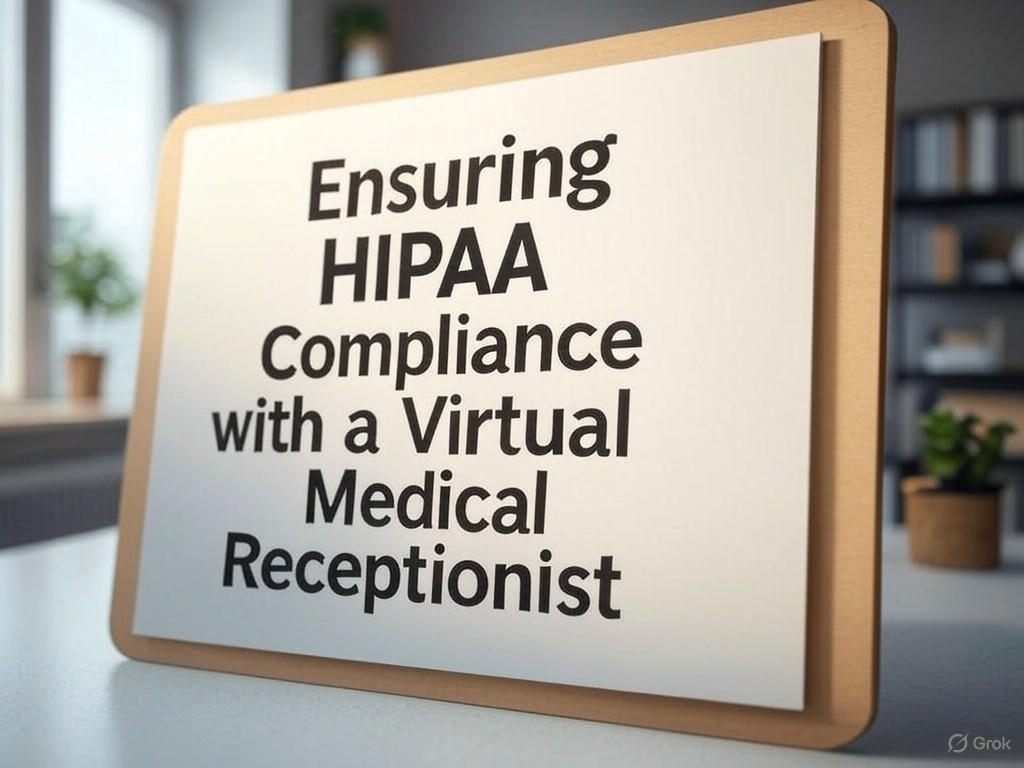In the healthcare industry, maintaining the confidentiality and privacy of patient information is of utmost importance. The Health Insurance Portability and Accountability Act (HIPAA) sets strict guidelines to protect sensitive patient data from unauthorized access. As healthcare practices continue to evolve, the use of technology becomes increasingly significant in ensuring HIPAA compliance. One such technological advancement is the medical office virtual receptionist, which offers healthcare providers a streamlined and efficient way to handle patient interactions while maintaining privacy and compliance with HIPAA regulations.
In this article, we will explore the role of a virtual medical receptionist in ensuring HIPAA compliance, the benefits it provides, and how it supports healthcare providers in safeguarding patient information.
What is a Virtual Medical Receptionist?
A virtual medical receptionist is an automated or remote service designed to handle a variety of administrative tasks in a medical office. This includes scheduling appointments, answering phone calls, managing patient intake forms, confirming patient details, and more. By leveraging a virtual medical receptionist, healthcare practices can streamline their operations while maintaining the high standards of confidentiality required under HIPAA.
Virtual medical receptionists are particularly beneficial for small to medium-sized healthcare practices that may not have the resources for a full in-house reception team. They can provide a professional level of service while reducing the administrative burden and potential risk of HIPAA violations associated with human errors.
HIPAA Compliance and the Importance of Patient Privacy
HIPAA was established to ensure the privacy and security of healthcare data, and non-compliance can result in severe penalties for healthcare organizations. HIPAA compliance requires healthcare providers to protect patient information in all forms—whether oral, paper, or electronic.
One of the core principles of HIPAA is the confidentiality of Protected Health Information (PHI). PHI refers to any information related to a patient’s health status, treatment, or payment for healthcare services. HIPAA regulations dictate that only authorized individuals should have access to this sensitive information.
How a Virtual Medical Receptionist Ensures HIPAA Compliance
1. Secure Communication Channels
A virtual medical receptionist ensures HIPAA compliance by using secure communication channels. This means that all communication, whether through phone calls, email, or messaging, is encrypted and protected. By using secure networks, virtual medical receptionists prevent unauthorized access to patient data.
Traditional in-house receptionists often communicate using unencrypted methods, such as regular phone lines or personal email accounts, which may expose patient information to potential breaches. On the other hand, virtual medical receptionists utilize encrypted communication platforms that adhere to HIPAA’s security standards.
2. Automated Data Handling and Limited Access
Virtual medical receptionists are programmed to automatically handle patient data without human intervention. This reduces the risk of accidental breaches that could occur when sensitive information is handled by human staff members. For instance, a virtual medical receptionist can securely store patient data, schedule appointments, and send reminders while limiting access to only those with the proper authorization.
By automating these tasks, virtual medical receptionists help reduce the chances of human error and ensure that patient data is only accessed by authorized personnel, which is a critical component of HIPAA compliance.
3. Document Management and Secure Storage
HIPAA requires healthcare organizations to properly manage and store patient information, both physical and digital. Virtual medical receptionists can assist with this by ensuring that patient forms, appointment records, and other sensitive documents are stored in secure, HIPAA-compliant digital systems.
These virtual systems are designed to prevent unauthorized access and maintain an audit trail of any actions performed on the documents. This feature ensures that healthcare providers can track who accessed patient information and when, which is crucial for both security and compliance purposes.
4. Appointment Scheduling and Patient Verification
A virtual medical receptionist can verify patient information during appointment scheduling to ensure that the right data is entered into the system. This step helps eliminate errors that might result in PHI being compromised. Additionally, by automating this process, the receptionist can handle sensitive patient details without the risk of human error during manual entry.
For example, a virtual medical receptionist can cross-check patient information with the practice’s records before confirming an appointment. This minimizes the risk of errors that could lead to unauthorized disclosure of patient data.
5. Reducing Human Interaction and the Risk of Mistakes
Human interactions in medical offices often present opportunities for errors that can lead to HIPAA violations. A virtual medical receptionist reduces these risks by handling tasks without direct human involvement. This automation minimizes the chances of PHI being accidentally shared with unauthorized individuals, as the system can be programmed to adhere strictly to HIPAA regulations.
By limiting human interactions, the virtual medical receptionist also reduces the potential for “shoulder surfing” or overhearing of sensitive information in busy office environments.
Benefits of Using a Virtual Medical Receptionist for HIPAA Compliance
1. Cost-Effectiveness
Maintaining HIPAA compliance can be costly for healthcare practices, especially when it involves hiring full-time, trained personnel to handle administrative tasks. A virtual medical receptionist provides a cost-effective solution by offering services at a fraction of the cost of an in-house receptionist. This allows healthcare providers to allocate resources more efficiently while still ensuring compliance with HIPAA.
2. Increased Efficiency
The automation of routine administrative tasks allows healthcare providers to focus more on patient care. A virtual medical receptionist can handle phone calls, appointment scheduling, and patient intake forms seamlessly, leading to improved office efficiency. This can reduce wait times for patients, improve the overall patient experience, and allow the medical staff to focus on providing quality care.
3. Enhanced Security Features
Virtual medical receptionists are often equipped with advanced security features designed to protect patient information. These systems often include multi-factor authentication, encrypted communication, and data backup protocols, ensuring that patient data is stored securely and protected against potential breaches.
4. Scalability
As a healthcare practice grows, so does the volume of administrative tasks. A virtual medical receptionist can easily scale to meet the increasing demands without requiring additional personnel. This scalability ensures that HIPAA compliance is maintained even as the practice expands, allowing the practice to grow without compromising patient privacy.
5. 24/7 Availability
Virtual medical receptionists can operate around the clock, ensuring that patient data is always handled securely, regardless of the time of day. This is particularly beneficial for practices that offer extended hours or handle patients from different time zones. The ability to manage appointments and sensitive patient information 24/7 ensures that compliance is maintained at all times.
Key Considerations When Implementing a Virtual Medical Receptionist
While virtual medical receptionists offer numerous benefits, healthcare providers should ensure they select a solution that is fully HIPAA-compliant. Here are a few important considerations:
1. Choose a HIPAA-Compliant Service Provider
It’s essential to select a virtual medical receptionist service provider that is familiar with HIPAA regulations and has the necessary certifications to ensure compliance. The provider should be able to demonstrate how their system adheres to HIPAA’s privacy and security requirements.
2. Secure Data Storage and Encryption
Ensure that the virtual medical receptionist service offers secure data storage and encryption for all patient information. This includes encrypted communication channels and secure methods for storing sensitive documents.
3. Regular Audits and Monitoring
To maintain HIPAA compliance, healthcare providers should regularly audit and monitor the virtual receptionist system. This includes reviewing who accessed patient information, ensuring that only authorized personnel have access, and identifying any potential vulnerabilities in the system.
Conclusion
Incorporating a Medical Staff Relief virtual medical receptionist into a healthcare practice is an effective way to streamline administrative tasks while ensuring HIPAA compliance. By using secure communication methods, automating data handling, and minimizing human error, virtual medical receptionists offer healthcare providers a secure and efficient solution for managing patient interactions. With the right system in place, healthcare practices can safeguard patient privacy, improve efficiency, and reduce the risks associated with non-compliance.
By adopting a virtual medical receptionist, healthcare providers can confidently meet HIPAA requirements, enhance their operational efficiency, and ensure the highest level of security for patient data.






